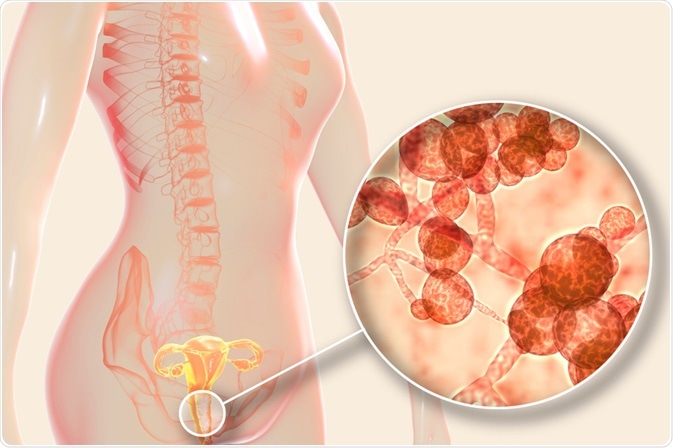Vaginitis is a condition involving inflammation of the vagina and the vulva, which may arise due to several different causes. Various types of infections may be responsible, in addition to reactions following topical contact with certain chemicals and hormonal level changes in the body.

Image Credit: Kateryna Kon / Shutterstock.com
Candida infection
Also known as yeast or fungal infection, candida is the cause of the majority of vaginitis cases. Candida is part of the normal flora in the vagina and other areas of the body, such as the digestive tract, but in some cases, it can overgrow to cause an infection of the vagina.
This type of vaginitis is associated with a thick, white discharge from the vagina that does not usually have a pungent odor. As a result of the infection, it is common for women to notice itchiness in the area.
There are various circumstances that may lead to an increased risk of candida infection due to a disruption in the normal balance of bacteria in the vagina, which include:
- Recent antibiotic therapy
- Uncontrolled diabetes
- Pregnancy
- Menopause
- Hormonal contraceptives
- Immunosuppressive disorders or medication
- Thyroid or endocrine disorders
Bacterial infection
Bacterial vaginitis is an infection of the vagina caused by bacteria and is often marked by a discharge that is milky in consistency, although this can vary greatly according to the causative bacteria. It is usually accompanied by a fish-like odor, which is more distinct after sexual intercourse. In contrast to candida infection, it does not often present with redness and itchiness.
The causative bacteria typically exist in the vaginal area but have overgrown to cause an infection and the resulting symptoms. Bacterial vaginitis requires antibiotic treatment to target the bacteria, which differs from the antifungal treatments required for a fungal infection.
Chemical irritation
Symptoms of vaginitis may also emerge following exposure of the area to substances that cause irritation to some women. This is also known as non-infectious vaginitis, as the symptoms occur as a result of an inflammatory response to a chemical rather than an infection.
Substances that may cause inflammation in the vaginal area include:
- Vaginal sprays
- Vaginal douches
- Spermicidal products
- Perfumed soaps
- Body lotions
- Sexual lubricants
- Detergents
- Fabric softeners
Sexually transmitted infections
Vaginitis may also be caused by a sexually transmitted infection (STI) such as chlamydia, gonorrhea trichomoniasis, or herpes simplex virus (HSV). These infections can be passed on from one person to another through sexual activities and, as a result, are more common among young women who do not use adequate protection with multiple sexual partners.
Chlamydia and gonorrhea both occur as a result of an infection with the bacteria, which may or may not cause symptoms in those affected. This makes it difficult to diagnose, as the symptoms are more subtle, such as light bleeding after intercourse and pain in the abdominal or pelvic area. It is more common in young women with multiple sexual partners.
Trichomoniasis is caused by protozoa, a type of bacteria that can infect the vagina and lead to a discharge that is frothy, pungent, and green-yellow in color. This infection commonly causes itching and soreness in the area and can make urination painful. Abdominal pain, particularly during intercourse and directly after menstruating, may also be evident.
HSV, also known commonly as herpes, is a type of infective virus that can be transmitted via sexual contact. Lesions on the vulva or inside the vagina characterize this type and often cause pain in the area. Women subject to stress are more likely to be subjected to this type of STI.
Hormonal changes
Significant changes in hormonal levels, particularly estrogen, can affect the balance of the vaginal area and cause vaginitis.
Contraceptive medications including the oral contraceptive pill (OCP) and intrauterine devices (IUD) that contain high levels of estrogen may disrupt the natural balance in the vaginal area and is linked to an increased risk of a candida infection.
Certain stages of life, such as pregnancy, breastfeeding, and menopause, may lead to a decrease in hormone dryness of the vagina, known as atrophic vaginitis. Additionally, some medications such as aromatase inhibitors used in the prevention and treatment of breast cancer can lead to atrophy of the vagina.
References
Further Reading
Last Updated: Apr 1, 2021